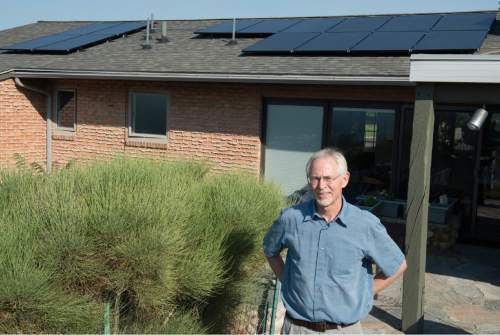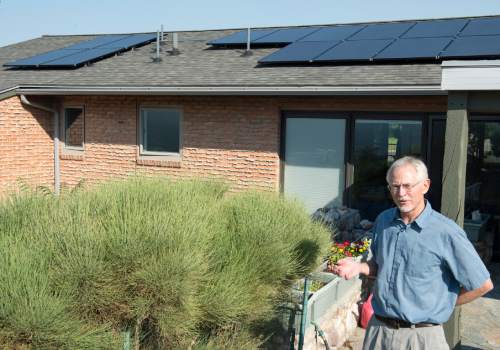This is an archived article that was published on sltrib.com in 2015, and information in the article may be outdated. It is provided only for personal research purposes and may not be reprinted.
The city of Kaysville has entered Utah's fray over net metering, a practice that encourages solar power by allowing utility customers to exchange excess power they produce for credits that offset their utility bills.
To the dismay of clean energy advocates, city officials this month imposed a moratorium on new net-metering hookups out of concern that electrical customers who install solar panels on their roofs could be avoiding their share of the power-distribution system's fixed costs.
"We don't want to come across as not supportive of alternative energy. Solar is a great solution," Mayor Steve Hiatt said. "But if we have solar customers drawing on the system and never paying anything for maintenance, that's where the concern comes from."
Kaysville's worries mirror those voiced by Rocky Mountain Power, Utah's largest utility, in its ongoing and controversial quest to impose a monthly "facilities surcharge" on its net-metered customers.
Kaysville will use the next few months to revise its policies for net metering under a process that's fair and transparent, the mayor said. The relatively affluent Davis County community of 28,000 is among 26 Utah cities that belong to the Utah Associated Municipal Power Systems, or UAMPS. These municipalities, spread around the entire state, provide electrical power to their residents.
Some of those cities are increasingly concerned that proliferation of rooftop solar could disrupt the reliability of their distribution systems and the fairness of their rate structures, according to Mark Montgomery, head of Logan's power department. Logan is rethinking net metering, but has no plans to impose a moratorium.
"The net-metering policy was put in place to encourage renewable energy, but it may have been shortsighted," Montgomery said. "We have a certain amount of fixed costs. We calculate our fixed cost is $46 [per customer per month]. So if I have customers who are offsetting their entire bills, those fixed costs have to be pushed to those who do not have net metering. We are either unfair or unsustainable."
Logan only has 37 net-metered customers but the number is quickly increasing with three to five applications a week, Montgomery said.
Solar arrays are becoming a more attractive investment thanks to dropping costs, generous tax credits and net-metering programs. Some conservative economists contend government policies may be distorting the market and creating a "bubble" in solar power — which is available when the sun is out.
Solar can undermine the stability of the grid by flooding it with juice for brief peak periods.
But advocates believe "distributed" power generation from renewable sources is the best path to a smarter, cleaner energy future.
"Our utilities need to embrace these families' decisions to invest in clean air and clean energy," said Matt Pacenza of HEAL Utah. "We should be encouraging these choices, which benefit all of us, not slapping moratoriums and taxes on them."
But on June 2, the Kaysville City Council unanimously decided it needs a six-month moratorium after hearing a report by Bruce Rigby, head of the city's power department.
"Review is necessary because the impact of participation is greater than anticipated," his written recommendation said. He told the council he is receiving two to three new net-meter applications a week.
Still, only 50 of 8,900 power customers are net metered under the city's program, in place for four years.
"That's one-half of 1 percent of all households in Kaysville," Pacenza said. "We're having a hard time believing a few dozen families embracing clean energy is imposing a significant burden on the other ratepayers."
Hiatt said his city did not anticipate the controversy triggered by the moratorium, which is necessary to answer critical unresolved questions before net metering becomes truly widespread and entrenched.
For example, Kaysville has found some homeowners are tempted to overbuild their systems so that their output exceeds the customer's overall electrical needs.
"Is the city supposed to pay them a full retail rate for that excess power?" Hiatt asked.
He promised a new policy would emerge after a fair and transparent process that involves photovoltaic companies and solar-powered homes.











